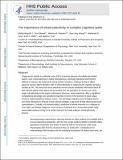| dc.contributor.author | Rigotti, Mattia | |
| dc.contributor.author | Barak, Omri | |
| dc.contributor.author | Warden, Melissa R. | |
| dc.contributor.author | Wang, Xiao-Jing | |
| dc.contributor.author | Daw, Nathaniel D. | |
| dc.contributor.author | Miller, Earl K. | |
| dc.contributor.author | Fusi, Stefano | |
| dc.date.accessioned | 2016-05-13T16:48:40Z | |
| dc.date.available | 2016-05-13T16:48:40Z | |
| dc.date.issued | 2013-05 | |
| dc.date.submitted | 2012-09 | |
| dc.identifier.issn | 0028-0836 | |
| dc.identifier.issn | 1476-4687 | |
| dc.identifier.uri | http://hdl.handle.net/1721.1/102480 | |
| dc.description.abstract | Single-neuron activity in the prefrontal cortex (PFC) is tuned to mixtures of multiple task-related aspects. Such mixed selectivity is highly heterogeneous, seemingly disordered and therefore difficult to interpret. We analysed the neural activity recorded in monkeys during an object sequence memory task to identify a role of mixed selectivity in subserving the cognitive functions ascribed to the PFC. We show that mixed selectivity neurons encode distributed information about all task-relevant aspects. Each aspect can be decoded from the population of neurons even when single-cell selectivity to that aspect is eliminated. Moreover, mixed selectivity offers a significant computational advantage over specialized responses in terms of the repertoire of input–output functions implementable by readout neurons. This advantage originates from the highly diverse nonlinear selectivity to mixtures of task-relevant variables, a signature of high-dimensional neural representations. Crucially, this dimensionality is predictive of animal behaviour as it collapses in error trials. Our findings recommend a shift of focus for future studies from neurons that have easily interpretable response tuning to the widely observed, but rarely analysed, mixed selectivity neurons. | en_US |
| dc.description.sponsorship | Gatsby Charitable Foundation | en_US |
| dc.description.sponsorship | Swartz Foundation | en_US |
| dc.description.sponsorship | Kavli Foundation | en_US |
| dc.description.sponsorship | National Institute of Mental Health (U.S.) (Grant 5-R37-MH087027-04) | en_US |
| dc.description.sponsorship | Picower Foundation | en_US |
| dc.description.sponsorship | Brain & Behavior Research Foundation (Young Investigator Grant) | en_US |
| dc.language.iso | en_US | |
| dc.publisher | Nature Publishing Group | en_US |
| dc.relation.isversionof | http://dx.doi.org/10.1038/nature12160 | en_US |
| dc.rights | Article is made available in accordance with the publisher's policy and may be subject to US copyright law. Please refer to the publisher's site for terms of use. | en_US |
| dc.source | PMC | en_US |
| dc.title | The importance of mixed selectivity in complex cognitive tasks | en_US |
| dc.type | Article | en_US |
| dc.identifier.citation | Rigotti, Mattia, Omri Barak, Melissa R. Warden, Xiao-Jing Wang, Nathaniel D. Daw, Earl K. Miller, and Stefano Fusi. “The Importance of Mixed Selectivity in Complex Cognitive Tasks.” Nature 497, no. 7451 (May 19, 2013): 585–90. | en_US |
| dc.contributor.department | Massachusetts Institute of Technology. Department of Brain and Cognitive Sciences | en_US |
| dc.contributor.department | Picower Institute for Learning and Memory | en_US |
| dc.contributor.mitauthor | Warden, Melissa R. | en_US |
| dc.contributor.mitauthor | Miller, Earl K. | en_US |
| dc.relation.journal | Nature | en_US |
| dc.eprint.version | Author's final manuscript | en_US |
| dc.type.uri | http://purl.org/eprint/type/JournalArticle | en_US |
| eprint.status | http://purl.org/eprint/status/PeerReviewed | en_US |
| dspace.orderedauthors | Rigotti, Mattia; Barak, Omri; Warden, Melissa R.; Wang, Xiao-Jing; Daw, Nathaniel D.; Miller, Earl K.; Fusi, Stefano | en_US |
| dspace.embargo.terms | N | en_US |
| mit.license | PUBLISHER_POLICY | en_US |
